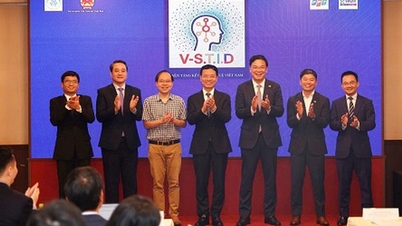Huge revenue from livestream sessions
In the 4.0 era of technology explosion, everyone is livestreaming to sell products online. The titles "livestream warrior", "order closing queen"... were born from there. There are livestream sessions that earn billions of dong in revenue, so the practice of stores and brands hiring artists, hot girls, hot Facebookers, hot TikTokers... to livestream is increasingly popular.

Actor Hoa Hiep revealed his main income comes from online sales.
That is why recently famous individuals have also focused on participating and promoting this activity because the income is much higher than the salary for attending regular events. For example, model Diep Lam Anh has often livestreamed to sell products in recent months. The beauty revealed that the biggest online sales revenue she has ever achieved was 4 billion VND in a livestream, the profit earned is 10-20 times higher than the salary for attending events.
Similarly, comedian Le Duong Bao Lam often helps his wife sell products online. Thanks to his eloquence, he is noticed by brands and invited to livestream to sell and introduce products. Le Duong Bao Lam revealed that it is his livestream sales job that has helped his family's life "prosper". The actor expressed his pride in being able to use this income to build a house, buy a car, take care of his own family as well as both sets of parents, and even send his younger siblings to college.
Actor Hoa Hiep also ventured into livestreaming to sell snacks. This is the main source of income for him and his family. The actor once shared that the salary he earned from playing the main role in a 30-episode drama for 2 months was only equivalent to the revenue from 1-2 days of livestreaming to sell products...
KOL with the stage name PewPew (real name Hoang Van Khoa) often livestreams to sell groceries online on TikTok and is known as one of the "four livestream kings" of Vietnam. PewPew's live viewership sometimes reaches more than 100,000 viewers. This individual once boasted that on average each livestream session sells about 200 orders or more and receives invitations from more than 2,000 brands. From there, viewers predict that he has a huge income from brands.

Pewpew is famous as the "four kings of livestream" of Vietnam.
Or recently, the fake and smuggled goods warehouses that were busted on social networks while livestreaming to sell goods all belonged to hot girls with a huge number of customers closing orders. For example, the warehouse of hot girl Nguyen Hoang Mai Ly in Do Nghia urban area, Yen Nghia ward, Ha Dong district, Hanoi city, in just the livestream session on December 23, this hot girl's Mailystyle.com account held a 12-hour live session with 647,000 views and 4,100 comments closing product orders. On the Facebook platform Mailystyle.com has 332,000 likes and 520,000 followers publicly posting Nguyen Hoang Mai Ly's bank account number with 12 phone numbers to close orders and advise customers. Not to mention, this hot girl also has a personal page that regularly livestreams, with thousands of orders closed.
Previously, Gia Lai province authorities suddenly raided a warehouse while employees were livestreaming sales on the account "Ngoc Quyen Gia Lai". Business household Truong Ngoc Quyen showed signs of using a sales application without notifying the competent authorities; trading in counterfeit goods, goods of unknown origin, and smuggled goods. The goods were products such as perfumes with the brands Gucci, Tom Ford, YSL, Chanel, Louis Vuitton, Dior, Boss, Sauvage, Lancôme, Kilian...; shoes, sandals, bags, wallets with the brands Louis Vuitton, Chanel, Adidas, Nike; cosmetics with the brands Vaseline, Bioderma; functional foods for rapid weight loss within 7 days and a series of household and consumer goods of unknown origin. Business household Truong Ngoc Quyen did not have a fixed store.

Truong Ngoc Quyen's warehouse of counterfeit goods in Gia Lai was discovered by authorities.
All goods are sold on e-commerce platforms, specifically livestreaming through personal Facebook under the name "Ngoc Quyen Gia Lai", this account has hundreds of thousands of followers. The livestreams are also replayed on other accounts named "Ngoc Quyen".
During the livestream sessions monitored by the market management force, many products such as shoes with the brands Gucci, Adidas, Nike were offered by this business household for sale at prices ranging from 80,000 to over 100,000 VND/product. Watches and eyeglasses with the brands Versace, Gucci, LV were priced from 30,000 VND to under 200,000 VND/product. Cosmetics, consumer goods, and laundry detergents were priced from 20,000 to under 100,000 VND/product.
In fact, livestreaming is becoming an explosive trend, generating huge revenue for both sellers and those hired to livestream. However, what many people have long been concerned about is how much tax these individuals pay on their huge incomes.
An online marketing consulting service said that the price list for hiring KOLs to livestream to promote products and sell products is based on criteria including the number of followers, area of expertise, scale and campaign of the business. In which, the number of followers is the most important criterion.
The reference price list shows that a KOL with 10,000 - 50,000 followers will have a rental fee to do livestream on TikTok ranging from 1 - 3 million VND; if the KOL has 50,000 - 500,000 followers, the rental price will increase from 3 - 30 million VND/session. If doing it on Facebook, the price will be different, maybe 5 - 6 times higher... Therefore, many of the most famous KOLs in this field are estimated to have an annual income of up to billions of VND or tens of billions of VND, which is also reasonable.
Anti-tax loss
According to the tax laws of the State, ministries, branches, individuals doing business online or traditionally must fulfill the obligation to pay personal income tax and other taxes. Currently, there are many regulations to prevent tax losses for online sales activities on social networking sites as well as on e-commerce platforms, for example, Decree 126/2020 detailing a number of articles of the Law on Tax Administration clearly states that commercial banks are responsible for providing taxpayers' account information, although many online businesses selling counterfeit and fake goods have been destroyed, but in reality, it is just like a drop in the ocean. Controlling e-commerce payment activities is extremely difficult, when there are hundreds of thousands of individuals, households... doing business online.

The warehouse with many violations of hotgirl Nguyen Hoang Mai Ly has just been inspected and handled by authorities.
Remember in mid-June 2023, through reconnaissance work to grasp the situation, the Department of Cyber Security and High-Tech Crime Prevention of Da Nang City Police discovered 6 establishments participating in e-commerce activities with signs of violating the law. These establishments had online sales revenue of more than 223 billion VND but did not declare and fulfill tax obligations.
According to Mr. Nguyen Huu Tuan, Head of the Department of E-commerce Management, Department of E-commerce and Digital Economy (Ministry of Industry and Trade), the e-commerce sector in Vietnam last year witnessed a growth rate of about 20% and reached 16.4 billion USD, with each person spending at 300 USD/year. The rapid growth rate makes it difficult to avoid problems such as counterfeit goods, fake goods and tax losses.
According to the Department of Tax Management for Small and Medium Enterprises, Business Households and Individuals (General Department of Taxation), the biggest difficulty in managing e-commerce tax at present is fully managing revenue sources and taxpayers, especially when they are not registered for business and do not have a fixed business establishment.
There is currently a regulation requiring commercial banks and payment intermediary service providers to withhold and pay taxes on behalf of foreign suppliers conducting e-commerce business with organizations and individuals in Vietnam without a permanent establishment and without proactively registering, declaring, and paying taxes in Vietnam. However, this regulation has raised a number of unclear issues, causing confusion for commercial banks and payment intermediary service providers.
Many experts believe that, with the diversity of methods, controlling e-commerce payment activities is extremely difficult. In addition, even when determining the flow of money from one subject to another, it is not possible to confirm that it is a payment activity for e-commerce transactions, because there are hundreds of reasons for subjects to transfer money to each other. In addition, if the e-commerce business entity intentionally evades taxes and uses the cash on delivery (COD) payment method, controlling the flow of money to determine e-commerce transactions becomes even more difficult.
The trend of livestreaming to sell goods or doing business online is increasingly booming and this is an additional source of revenue that will increasingly increase for the state budget when many sources of revenue from enterprises and import-export are reduced due to economic difficulties, but it is also an opportunity for counterfeit, fake and smuggled goods to be mixed in. To prevent tax losses, it is necessary to have the synchronous participation of functional agencies. Tax authorities need to step up inspection and supervision activities, promote online business tax collection. There are forms of propaganda such as praising individuals who pay high taxes such as publishing a list of the businesses that pay the most taxes every year, and at the same time naming individuals who do not declare and pay taxes as a deterrent. It is necessary to also publish the identities of famous individuals, KOLs or individuals who are fined and have strict penalties. Carrying out these activities in parallel on a regular basis will have a higher propaganda and deterrent effect to prevent tax evasion and evasion.
Individuals selling online are subject to the tax law on business individuals. According to the current tax law, business individuals, regardless of whether they do business in the traditional form or e-commerce, or livestream sales on social networking platforms, are subject to value added tax and personal income tax if they generate revenue of 100 million VND/year or more.
Source































































































Comment (0)